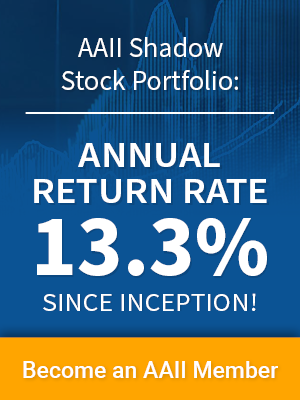Based on key financial metrics such as the price-to-sales ratio, shareholder yield and the price-earnings ratio, the following 3 stocks made the list for top value stocks in the Food Products industry. Those looking for value stocks to add to their portfolio may want to use this list as a starting point for further investment research.
Why Focus on Undervalued Food Products Stocks?
Value investors seek to buy stocks at a discount to their intrinsic value. Long-term returns show that such strategies are advantageous. Value stocks, as a group, tend to outperform growth stocks over extended periods of time. Typically, value investors perform financial analysis of numerous metrics, don’t follow the herd and are long-term investors.
AAII’s A+ Investor Value Grade is derived from a stock’s Value Score. The Value Score is the percentile rank of the average of the percentile ranks of the price-to-sales ratio, price-earnings ratio, enterprise-value-to-EBITDA (EV/EBITDA) ratio, shareholder yield, price-to-book-value ratio and price-to-free-cash-flow ratio. The score is variable, meaning it can consider all six ratios or, should any of the six ratios not be valid, the remaining ratios that are valid. To be assigned a Value Score, stocks must have a valid (non-null) ratio and corresponding ranking for at least two of the six valuation ratios.
What Goes Into AAII’s Value Grade?
Stock evaluation requires access to huge amounts of data as well as the knowledge and time to sift through it all, make sense of financial ratios, read income statements and analyze recent stock movement. AAII created A+ Investor, a robust data suite that condenses data research in an actionable and customizable way suitable for investors of all knowledge levels, to help investors with that task.
AAII’s proprietary stock grades come with A+ Investor. These offer intuitive A–F grades for more than just value. It is possible for a stock to appear cheap based on one valuation metric but appear expensive on another. It is also possible for one valuation ratio to be associated with outperforming stocks during certain periods of time but not others. Some stocks may even have null values for certain metrics like the price-earnings ratio or the price-to-book ratio but not others. An example of this would be a company with losses instead of profits or a negative book value because of heavy borrowing. Negative earnings or book value result in non-meaningful ratios that are left blank or null.
Click the button below to learn more about A+ Investor and subscribe today.

3 Undervalued Food Products Stocks
Of course, there are countless value stocks that are worth mentioning, but this is a concise list of the top 3 undervalued stocks in the Food Products industry for Wednesday, September 24, 2025. Let’s take a closer look at their individual scores to see how they measure up against each other and the Food Products industry median.
| Company | Ticker | Price/Sales | Price/Earnings | EV/EBITDA | Shareholder Yield | Price/Book Value | Price/Free Cash Flow | Value Grade |
| Archer-Daniels-Midland Company | ADM | 0.36 | 26.7 | 12.2 | 5.0% | 1.30 | 9.3 | B |
| Dole plc | DOLE | 0.15 | 11.2 | 7.0 | 2.3% | 0.92 | 121.5 | B |
| Flowers Foods, Inc. | FLO | 0.54 | 12.6 | 10.0 | 7.6% | 1.93 | 15.6 | A |
The Value Grade is assigned based on how each stock’s composite valuation compares to all other stocks.
The process for assigning grades starts with each variable for a given stock. The percentile rankings for all valid ratios that a stock has are calculated. So, for instance, a stock could have a price-to-book ranking in the 43rd percentile, a price-earnings ranking in the 67th percentile, a price-to-sales ranking in the 23rd percentile, etc. Then, those rankings are averaged for each stock. (A minimum of two valid variables are required, though all six will be used if available.)
Once the average of the individual variables is calculated, that average is ranked against all stocks. Put another way, each stock’s composite valuation is compared to all other stocks. These ranks are then sorted into quintiles from the cheapest 20% (a grade of A) to the most expensive 20% (a grade of F).
As always, we recommend that you conduct proper due diligence and research before investing in any security. We also suggest that investors utilize numerous grades, not just value, when it comes to deciding whether a company is a good fit for their allocation needs.
Archer-Daniels-Midland Company’s Value Grade
Value Grade:
| Metric | Score | ADM | Industry Median |
| Price/Sales | 13 | 0.36 | 0.76 |
| Price/Earnings | 64 | 26.7 | 19.0 |
| EV/EBITDA | 48 | 12.2 | 11.6 |
| Shareholder Yield | 16 | 5.0% | 0.4% |
| Price/Book Value | 35 | 1.30 | 1.79 |
| Price/Free Cash Flow | 20 | 9.3 | 20.1 |
Archer-Daniels-Midland Company engages in the procurement, transportation, storage, processing, and merchandising of agricultural commodities, ingredients, flavors, and solutions. It operates in three segments: Ag Services and Oilseeds; Carbohydrate Solutions; and Nutrition. The company originates, merchandises, stores, and transports agricultural raw materials, such as oilseeds and soft seeds. It engages in the agricultural commodity and feed product import, export, and distribution; and various structured trade finance activities. In addition, the company offers soybean meal and oil; vegetable and salad oils and protein meals; ingredients for the food, feed, energy, and industrial customers; margarine, shortening, and other food products; and partially refined oils to produce biodiesel and glycols for use in chemicals, paints, and other industrial products. Further, it provides peanuts, peanut-derived ingredients, and cotton cellulose pulp; sweeteners, corn and wheat starches, syrup, glucose, wheat flour, and dextrose; alcohol, and other food and animal feed ingredients; ethyl alcohol and ethanol; corn gluten feed and meal; distillers’ grains; corn germ; and citric acids. Additionally, the company provides proteins, natural flavors, flavor systems, natural colors, emulsifiers, soluble fiber, polyols, hydrocolloids, probiotics, prebiotics, postbiotics, enzymes, and botanical extracts; and other specialty food and feed ingredients; edible beans; formula feeds, and animal health and nutrition products; and contract and private label pet treats and food products. It also offers futures commission merchant; commodity brokerage; cash margins and securities pledged to commodity exchange clearinghouse; and cash pledged as security under certain insurance arrangements. It operates in the United States, Switzerland, the Cayman Islands, Brazil, Mexico, Canada, the United Kingdom, and internationally. The company was founded in 1902 and is headquartered in Chicago, Illinois.
Stocks with a Value Score from 81 to 100 are considered deep value, those with a score between 61 and 80 are value and so on.
Archer-Daniels-Midland Company has a Value Score of 78, which is considered to be undervalued.
When you look at Archer-Daniels-Midland Company’s price-to-sales ratio at 0.36 compared to the industry median at 0.76, this company has a lower price relative to revenue compared to its peers. This could make Archer-Daniels-Midland Company’s stock more attractive for value investors.
Archer-Daniels-Midland Company’s price-earnings ratio is 26.70 compared to the industry median at 19.05. This means it has a higher share price relative to earnings compared to its peers. This could make Archer-Daniels-Midland Company less attractive for value investors.
Now, let’s assess Archer-Daniels-Midland Company’s EV/EBITDA ratio, also known as enterprise multiple. At 12.2, when compared to the industry median of 11.6, the company may be considered overvalued in relation to its peers. Value investors could use the enterprise multiple to identify stocks that are considered overvalued or undervalued relative to their industry.
Shareholder yield is the sum of a stock’s dividend yield (paid over previous 12 months minus special dividends) and the percentage of net share buybacks over the previous 12 months. Archer-Daniels-Midland Company’s shareholder yield is higher than its industry median ratio of 0.40%. Value investors may look for an attractive shareholder yield because it can be a powerful tool for identifying if the company has a good management team.
As one of the most common value metrics, the price-to-book ratio evaluates a company’s current market price relative to its book value. Archer-Daniels-Midland Company’s price-to-book ratio is lower than its industry median ratio of 1.79. This could make Archer-Daniels-Midland Company more attractive to investors looking for a new addition to their portfolio.
Lastly, let’s take a look at Archer-Daniels-Midland Company’s price-to-free-cash-flow ratio (P/FCF), which can indicate a company’s market value relative to its operating cash flow. Archer-Daniels-Midland Company’s price-to-free-cash-flow ratio is lower than its industry median ratio of 20.10. This could make Archer-Daniels-Midland Company more attractive because the lower P/FCF ratio indicates that Archer-Daniels-Midland Company is undervalued. The P/FCF ratio metric can also be viewed over a long-term time frame to see if the company's cash flow to share price value is generally improving or worsening.
Dole plc’s Value Grade
Value Grade:
| Metric | Score | DOLE | Industry Median |
| Price/Sales | 6 | 0.15 | 0.76 |
| Price/Earnings | 21 | 11.2 | 19.0 |
| EV/EBITDA | 19 | 7.0 | 11.6 |
| Shareholder Yield | 30 | 2.3% | 0.4% |
| Price/Book Value | 20 | 0.92 | 1.79 |
| Price/Free Cash Flow | 94 | 121.5 | 20.1 |
Dole plc engages in sourcing, processing, marketing, and distribution of fresh fruit and vegetables worldwide. It operates through three segments: Fresh Fruit; Diversified Fresh Produce - EMEA; and Diversified Fresh Produce - Americas and ROW. The company offers bananas, pineapples, grapes, berries, avocados, organic produce, cherries, kiwis, apples, cherries potato, and onion. The company offers its products under DOLE brand. It serves retailers, wholesalers, and foodservice customers. Dole plc was incorporated in 2017 and is headquartered in Dublin, Ireland.
Stocks with a Value Score from 81 to 100 are considered deep value, those with a score between 61 and 80 are value and so on.
Dole plc has a Value Score of 80, which is considered to be undervalued.
Dole plc’s price-earnings ratio is 11.2 compared to the industry median at 19.0. This means that it has a lower price relative to its earnings compared to its peers. This makes Dole plc more attractive for value investors.
Dole plc’s price-to-book ratio is higher than its peers. This could make Dole plc less attractive for value investors when compared to the industry median at 1.79.
You can read more about Dole plc’s key financial metrics like shareholder yield, price-to-free-cash-flow and EV/EBITDA ratio, or learn more about its Momentum and Growth Grades, by subscribing to A+ Investor.
Flowers Foods, Inc.’s Value Grade
Value Grade:
| Metric | Score | FLO | Industry Median |
| Price/Sales | 19 | 0.54 | 0.76 |
| Price/Earnings | 27 | 12.6 | 19.0 |
| EV/EBITDA | 36 | 10.0 | 11.6 |
| Shareholder Yield | 8 | 7.6% | 0.4% |
| Price/Book Value | 49 | 1.93 | 1.79 |
| Price/Free Cash Flow | 39 | 15.6 | 20.1 |
Flowers Foods, Inc. produces and markets packaged bakery food products in the United States. The company’s principal products include fresh breads, buns, rolls, snack items, bagels, English muffins, and tortillas, as well as frozen breads and rolls under the Nature’s Own, Dave’s Killer Bread, Wonder, Canyon Bakehouse, Mrs. Freshley’s, and Tastykake brand names. It distributes its products through a direct-store-delivery distribution and a warehouse delivery system, as well as operates bakeries. The company’s customers include national and regional restaurants, institutions and foodservice distributors, and retail in-store bakeries; wholesale distributors; mass merchandisers, supermarkets, vending outlets, and convenience stores; quick-serve chains, food wholesalers, institutions, dollar stores, and vending companies; and public health care, military commissaries, and prisons, and other governmental institutions. The company was formerly known as Flowers Industries and changed its name to Flowers Foods, Inc. in 2001. Flowers Foods, Inc. was founded in 1919 and is headquartered in Thomasville, Georgia.
Stocks with a Value Score from 81 to 100 are considered deep value, those with a score between 61 and 80 are value and so on.
Flowers Foods, Inc. has a Value Score of 83, which is considered to be undervalued.
Flowers Foods, Inc.’s price-earnings ratio is 12.6 compared to the industry median at 19.0. This means that it has a lower price relative to its earnings compared to its peers. This makes Flowers Foods, Inc. more attractive for value investors.
Flowers Foods, Inc.’s price-to-book ratio is lower than its peers. This could make Flowers Foods, Inc. more attractive for value investors when compared to the industry median at 1.79.
You can read more about Flowers Foods, Inc.’s key financial metrics like shareholder yield, price-to-free-cash-flow and EV/EBITDA ratio, or learn more about its Momentum and Growth Grades, by subscribing to A+ Investor.

Other Food Products Stock Grades
Value is just one of the five Stock Grades included in our A+ Investor service. AAII members can see the top-graded stocks—those with grades of A or B for value, growth, momentum, earnings estimate revisions and quality—on the A+ Stock Grades Screener.
Also, if you want full access to all of AAII’s premium services, you can subscribe to one convenient bundled plan called AAII Platinum where you can try out A+ Investor, AAII Dividend Investing, the Stock Superstars Report, Growth Investing and VMQ Stocks. With the other premium services, you can dive deep into additional metrics, portfolios, commentary and information about Food Products stocks as well as other industrys.
Choosing Which of the 3 Best Food Products Stocks Is Right for You
Choosing which value stocks to invest in will ultimately depend on your individual goals and allocation; however, comparing similar value stocks in the same industry can help you analyze which might be better investments for you in the long run. So, let’s take a look at the Value Grade for all of our stocks.
- Archer-Daniels-Midland Company stock has a Value Grade of B.
- Dole plc stock has a Value Grade of B.
- Flowers Foods, Inc. stock has a Value Grade of A.
Now that you have a bit more background about each of the 3 undervalued stocks in the Food Products industry as well as their overall grades, it’s time for you to conduct additional research to see if these could fit your portfolio needs based on your goals and risk tolerance. AAII can help you figure out both and identify which investments align with what works best for you.
We do so through a program of education that teaches you to invest for yourself and become an effective manager of your own wealth—no more relying on others for your financial independence. You can rely on AAII for timeless articles on financial planning and stock-picking, unbiased research and actionable analysis that makes you a better investor.
A+ Investor adds to that qualitative teaching by giving you a powerful data suite that helps you whittle down investment decisions to find stocks, exchange-traded funds (ETFs) or mutual funds that meet your needs.

Additional Resources About Food Products Stocks
Want to learn more about Food Products stocks to see if they could be the right investment for you? Check out some additional resources and articles to help you on your financial journey.
- 3 Undervalued Food Products Stocks for Wednesday, September 24
- 3 Undervalued Food Products Stocks for Tuesday, September 23
- Why Barfresh Food Group, Inc.’s (BRFH) Stock Is Up 6.49%
- Why Borealis Foods Inc.’s (BRLS) Stock Is Up 6.64%
AAII Disclaimer
We make no representations or warranties that any investor will, or is likely to, achieve profits similar to those shown, because past, hypothetical or simulated performance is not necessarily indicative of future results. Before making an investment decision, you should consider your circumstances and whether the information on our content is applicable to your situation. This information was prepared in good faith and we accept no liability for any errors or omissions. The full disclaimer can be read here.
 Included With AAII Platinum
Included With AAII Platinum
Screen: 23.7%
Annual Gain Since Inception. Data as of 12/31/2024.

769.3% Stock Superstars Portfolio Total Return Since Inception

U.S. Index ETF (IYY)
SSR Group 3 O'Shaughnessy portfolio has a 411.2% gain since inception performance compared to IYY at only 119.1%% Performance as of 11/29/24.
FREE REPORT

BECOME A MEMBER FOR ONLY $2
Get access to powerful investment discovery tools and a wealth of investment education to help you achieve your financial goals.




